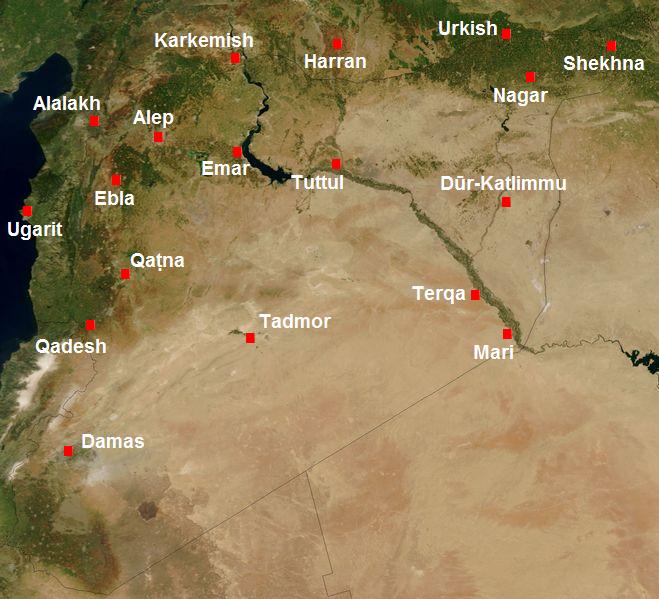Zahiran on:
[Wikipedia]
[Google]
[Amazon]
 Zahiran also known as Sahiri or Sa-hi-ri, also known as Zahiran was an
Zahiran also known as Sahiri or Sa-hi-ri, also known as Zahiran was an
Iron Age
The Iron Age is the final epoch of the three-age division of the prehistory and protohistory of humanity. It was preceded by the Stone Age (Paleolithic, Mesolithic, Neolithic) and the Bronze Age (Chalcolithic). The concept has been mostly appl ...
city of the ancient near east
The ''Near East''; he, המזרח הקרוב; arc, ܕܢܚܐ ܩܪܒ; fa, خاور نزدیک, Xāvar-e nazdik; tr, Yakın Doğu is a geographical term which roughly encompasses a transcontinental region in Western Asia, that was once the hist ...
. It was a city in what is today Syria
Syria ( ar, سُورِيَا or سُورِيَة, translit=Sūriyā), officially the Syrian Arab Republic ( ar, الجمهورية العربية السورية, al-Jumhūrīyah al-ʻArabīyah as-Sūrīyah), is a Western Asian country loc ...
.
During the Mari-Ebla war (2300 BC) Zahiran was the site of a battle between Igrish-Halam
Igrish-Halam or Igriš-Halab, was a king of the ancient city state of Ebla. His name means "(The god of) Halab has driven away (the opponent)", hence, the name might be a commemoration of an Eblaite victory that led to the incorporation of land ...
King of Ebla, and Iblul-il
Iblul-Il (reigned c. 2380 BC), was the most energetic king ( Lugal) of the second Mariote kingdom, noted for his extensive campaigns in the middle Euphrates valley against the Eblaites, and in the upper Tigris region against various opponents, w ...
, King of Mari.
About a decade latter it would have been absorbed into the empire of Sargon of Akkad
Sargon of Akkad (; akk, ''Šarrugi''), also known as Sargon the Great, was the first ruler of the Akkadian Empire, known for his conquests of the Sumerian city-states in the 24th to 23rd centuries BC.The date of the reign of Sargon is highl ...
.
The town was sacked in the Battle of Nineveh (612 BC). The chronicle
A chronicle ( la, chronica, from Greek ''chroniká'', from , ''chrónos'' – "time") is a historical account of events arranged in chronological order, as in a timeline. Typically, equal weight is given for historically important events and lo ...
of Aššur-uballit II, known as Chronicle 3, states of the Battle of Nineveh between Babylon
''Bābili(m)''
* sux, 𒆍𒀭𒊏𒆠
* arc, 𐡁𐡁𐡋 ''Bāḇel''
* syc, ܒܒܠ ''Bāḇel''
* grc-gre, Βαβυλών ''Babylṓn''
* he, בָּבֶל ''Bāvel''
* peo, 𐎲𐎠𐎲𐎡𐎽𐎢 ''Bābiru''
* elx, 𒀸𒁀𒉿𒇷 ''Babi ...
ian and Assyria
Assyria (Neo-Assyrian cuneiform: , romanized: ''māt Aššur''; syc, ܐܬܘܪ, ʾāthor) was a major ancient Mesopotamian civilization which existed as a city-state at times controlling regional territories in the indigenous lands of the A ...
n armies that "''in the month Âbu the king of Akkad Akkad may refer to:
*Akkad (city), the capital of the Akkadian Empire
*Akkadian Empire, the first ancient empire of Mesopotamia
*Akkad SC, Iraqi football club
People with the name
*Abbas el-Akkad, Egyptian writer
*Abdulrahman Akkad, Syrian LGBT act ...
and his army went upstream to Mane, Sahiri and Bali-hu. He plundered them, sacked them extensively and abducted their gods.''"Bill T. Arnold, Bryan E. Beyer, Readings from the Ancient Near East: Primary Sources for Old Testament
The Old Testament (often abbreviated OT) is the first division of the Christian biblical canon, which is based primarily upon the 24 books of the Hebrew Bible or Tanakh, a collection of ancient religious Hebrew writings by the Israelites. The ...
Study (Baker Academic, 2002) p. 156.
References
{{reflist, 2 Amorite cities Former populated places in Syria Tells (archaeology) Bronze Age sites in Syria 7th century BC